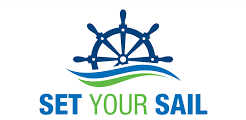
2024 CAI-NC Annual Conference
~Wilmington, NC~
Brooke Doyle, Regional Director
Bradley Feuss, Executive Loss Consultant
Strategic Claim Consultants
The presentation will delve into the intricacies of capturing insurance claim property assessments, emphasizing the importance of accurately monitoring mitigation to understand the coverages provided by insurance policies. It will highlight the key stakeholders involved, including the emergency response team, and who bears the financial burden in the event of a large loss insurance claim.
- Capturing insurance claim property assessments
- Monitoring mitigation: What coverages does your insurance policy actually afford you?
- Stakeholders involved and the emergency response team
- Who levies the financial burden of a large loss insurance claim
- Temporary repairs vs. permanent repairs: What qualifies?
- Legal Compliance and Documentation
Tyler Windham
Mark Trigonoplos
USI Insurance Services
This session will cover:
- Alignment of policies to governing docs:
- The governing documents (bylaws & CC&R’s) along with state statutes dictate what the insurance policy(s) should cover. They will dictate what is considered a LCE and what is the responsibility of the association from an insurance perspective. Properly aligning the insurance with the docs is paramount in protecting the association and its board members from being liable for a lawsuit for failure to procure adequate coverage.
- State of the Marketplace for Community associations
- What’s happening in the insurance marketplace for community associations? We’ll highlight carrier access and limitations, what we are seeing from a rate standpoint, and restrictions and limitations being implemented by insurance companies.
- How to correctly design an insurance RFP
- We will detail the correct way to design an insurance RFP for community associations that will highlight structure, what is truly important, and how to ensure that you select the best agent possible without prejudice and without conflict of interest.
- What to look for in an insurance agent for your community association
- This will tie into the RFP design in showing what to look for in your insurance agent when selecting who your broker is.
- Why you should choose one agent to represent your association (with limited exceptions)
- We will debunk the myth that having multiple agents involved will provide you with a better result for your insurance and tell you about the only times it makes sense to have more than 1 agent involved in your insurance process.
- How to control your insurance costs
- What could/should you be doing as an association to control your insurance costs and make your association a “best-in-class” risk in the insurance company’s eyes?
Matthew Jones
Attorney, Ward and Smith, P.A.
- What is the Corporate Transparency Act?
- How does the Act apply to homeowners associations?
- What information must you submit to comply with the Act?
- How can an Association prepare to comply with the Act?
- What are the consequences of not complying with the Act?
- What are our ongoing responsibilities after our first submission
Jennifer Burch, PCAM, AMS 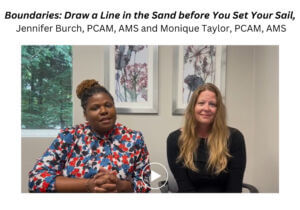
VP of Development and Board Member Training, PPM, Inc.
Monique Taylor, PCAM, AMS
VP of Development and Client Relations, PPM, Inc.
What happens between excitement for the job and being ready to quit or leave the industry altogether? Have expectations changed, or have we? Join us for an interactive session that builds space for airing it all out, analyzing the process, and finding practical solutions – with a bit of comic relief. We share real-life scenarios and engage professionals and leaders of all stages to share how they have / would have handled a situation and discuss why certain approaches may or may not be successful.
- The root of industry burnout can often be attributed to a lack of setting or maintaining appropriate boundaries. Realizing this can empower you to steer who you will be as a professional.
- Communicate! Don’t assume everyone’s in the same boat and that therefore you must suffer in silence. From leadership to colleagues to clients, we must communicate our boundaries and our challenges.
Acknowledge how expectations have changed as communication has evolved and demands have increased. - Evaluate how you can meet certain expectations and accept why others should not be met.
- Recognize the pitfalls and your own susceptibility, and then build solutions to help improve manager retention for a company and personal / professional growth for oneself.
- You can only control boundaries for yourself – but you can educate your audience without compromising your professional standards.
- Educate yourself on the possible causes behind unreasonable expectations and make adjustments if you can, to respond to the underlying needs where appropriate.
Let’s keep it real – you won’t always turn it around, but you can manage issues without compromising the rules, your professionalism, or your sanity. This session includes real discussion about navigating difficult yet relatable situations, setting boundaries, and continuing with integrity.
Chris Gelwicks
Attorney, The McIntosh Law Firm
Richard Orduno, PCAM, AMS, CMCA
CAMS
With legislation pending around the nation, managers and boards need to understand the issues now so to identify them when they arise and can address them with appropriate care and scrutiny.
Nationwide trends
- Federal law on discrimination as applied to transgender individuals
- How these issues impact community associations in areas such as pools, bathrooms, changing rooms, and even being eligible to sit on a board
- Fair Housing Act scenarios
Planning for the future that is now - We’ll review best practices for when issues arise and in this interactive session, presenting scenarios that we will reason through together.
Ellen Wortman
Attorney, Wortman Law Firm, PLLC
Elizabeth Lilly, AMS, CMCA
Senior Manager, Premier Management Company
COVID legislation left non-profit corporations with new options for holding remote meetings and clarified their ability to conduct votes by mail in lieu of holding meetings. While those statutes have not changed, many Associations have returned to in person meetings, while others are struggling to balance demands for more use of technology with the statutory requirements.
We’ll review the current status of the law on remote, hybrid and in person meetings, as and voting both at and outside of meetings.
Increasing owner participation in community meetings is always challenging… we’ll discuss “directed” v. “quorum-only” meetings proxies and the practical issues involved in using one form or another. Which works best for your community and why?
We’ll address from the manager perspectives and practical aspects of running meetings in different formats, using different proxy forms, and increasing owner engagement.
Harmony Taylor, CCAL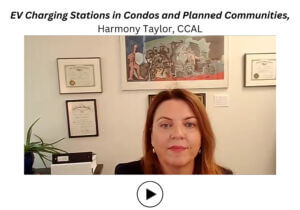
Partner, Law Firm Carolinas
Andrew Bateman, CIRMS, CMCA
Trisure
Chris Flythe, RS
Giles Flythe Engineers
Like the rest of the nation, North Carolina is seeing a boom in electric vehicle purchases and the related need for charging stations to keep these vehicles moving. Owners in condominiums and planned communities are increasingly interested in having EV charging stations available at home, whether that is within a nested condo parking deck and deeded spot, or a common area or privately owned driveway.
EV charging stations pose significant challenges that go beyond the typical architectural review and approval process. They require large amounts of power, careful installation, and pose new insurance challenges that must be addressed up front by associations. This presentation will address:
- When and how can associations allow the installation of EV charging stations by owners?
- Can or should an association install charging stations for common use?
- How can and should costs be allocated fairly among the parties benefitting from their installation?
- What are the essential insurance considerations related to EV charging stations- for owners and the association generally?
- What are the essential engineering considerations related to EV charging stations- for owners and the association generally?
Attendees will gain a solid basic understanding of legal, insurance and engineering considerations related to EV charging stations, and some practical guidance on best practices to follow when EV charging stations are installed to minimize cost, danger and liability to all parties.
Eric Bregman
Earney, PLLC
Adam M. Beaudoin, CCAL
Ward and Smith, P.A.
Learn the fundamentals of how community associations are treated for tax purposes at the federal and NC levels as well as the best ways to minimize tax burden on the Association. This session will explore in depth the most common misperceptions surrounding community association tax liability, and cover:
- The partial tax-exempt nature of your community association
- How to choose between filing an 1120 or 1120H tax return
- How to avoid paying Unrelated Business Income Tax
- How best to treat excess member income in a given tax year
- How association bank accounts are treated for tax purposes
- The value of an audit if the IRS comes calling
Participants will leave with some tricks up their sleeves to save their community associations money!
Robert Nordlund, RS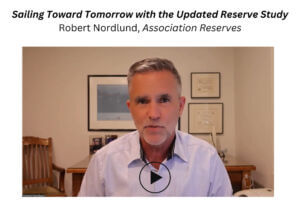
Founder/CEO, Association Reserves
Wayne Johnson
President, Association Reserves
The tragic collapse of Champlain Towers South in 2021 redefined the conversation about older buildings, deferred maintenance, and reserve funding. It changed the narrative about reserve funding from "oh well" to the level of a tragedy that was waiting to happen.
In addition to budget pressure and property values, life safety is now a big concern. Fortunately, National Reserve Study Standards were updated in 2022/23 to incorporate and recommend timely preventive maintenance and infrastructure inspections.
The reserve study frequency best practice has been updated to "every three years" instead of "every three to five years," and the recommended reserve study minimum is now 30 years out for planning and funding.
Learn key takeaways about these new standards and a matching strategy help your association successfully offset deterioration and prepare for upcoming Reserve projects. Mother Nature and Father Time always win. You need to put up a good defense or your association will suffer.
Chris Gelwicks
Attorney, The McIntosh Law Firm
Ben Rhodes, PCAM, AMS, CMCA
Senior VP, CAMS
Tyler Hall, RS
Giles Flythe Engineers
Homeowners and condominium owners’ associations, as they age, will likely be required to deal with capital repair projects. Whether it’s re-roofing the clubhouse, repairing the pool, or replacing the siding on a multi-building complex, managers and directors will need to know the ins and outs of terminology, trade practices, pricing, and the dreaded “change order.” Attendees will hear from a community association attorney, a PCAM, and an engineer who will all address key points on this topic, including:
- How to put together an RFP
- Bid solicitation
- Key terms in construction contracts, and avoiding ambiguity
- How to avoid change order pitfalls
- When and how to inspect the work
- Payments and close outs
- Best practices on managing through the project.
There will real-life scenarios from each presenter, providing the reality and best practices that managers and boards need to know.
Adam Marshall
Attorney, Law Firm Carolinas
Kay Thornton, PCAM, AMS, CMCA
President/Owner, Slatter Management Services
- Budgeting
- Assessments (regular & special)
- Special assessments
- Loans
While associations are nonprofits, they are still businesses that must pay bills. They can’t expect to stay stagnant in income (assessments) and effectively maintain the community and provide for their owners.
Post-Covid inflation has driven prices to an all-time high. Associations are finding it challenging to keep up with increased costs and member satisfaction. Despite increased costs, there is pressure from association members to keep the cost of assessments down. This seminar will broaden attendees’ knowledge of the multiple ways to increase income to the Association.
Board members’ fiduciary duty to fund the Association can rely on educating the membership on the importance of assessments that financially support the services the Association provides.
Special assessments and loans are not dirty words! They can transform an Association for the better!
Thomas Wolff
Attorney, Ward and Smith, P.A.
Pamela Linn, AMS, CMCA
President, Associate HRW Management
We’ll cover how the significant changes enacted with the CFPB's) final rule affect community associations' abilities to collect on delinquent accounts, and what changes need to be implemented internally to ensure compliance. This topic will be covered in the context of existing federal debt collection laws and strategies for addressing common issues faced by community managers and board members.
In addition to an overview of the new collections framework we’ll discuss practical guidance and best practices for community associations under the new rule.
This presentation is designed for community managers, account managers, and board members as well as legal professionals.
This engaging session will present:
- An overview of pressing environmental issues related to the outdoor spaces we all want to enjoy (for example, loss of topsoil, declining clean water sources, CO2 in the atmosphere).
- An understanding of how basic tree and tree-related systems work, e.g., soil biology.
- How to help? Ideas and strategies associations and homeowners can implement immediately. All are value-adds in some form, either through cost savings, aesthetic enhancement, or increasing the well-being of the client/public.
Melissa Ramsey, CMCA, AMS, LSM, PCAM 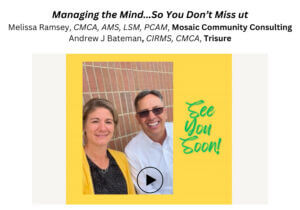
Owner/Consultant, Mosaic Community Consulting
Andrew J Bateman, CIRMS, CMCA
Trisure
Whether a manager, board member or vendor, we can all be mindful of our own emotional intelligence (EI) level on any given day and how it will impact those around us. Through communications, collaboration and creativity, we can lean into our EI to overcome and conquer the obstacles we are facing to truly achieve the unity in community!
- Intro with 5-6 questions to set the stage for mental engagement
- Emotional Intelligence and the 5-Step Model
- Communications with optimal listening and speaking clearly
- Collaboration for effective management with team, boards, and vendors
- Creativity to enhance the engagement of others through positive reinforcement
- Conclusion with the original 5-6 questions asked again for thoughts on how mindsets have shifted.

